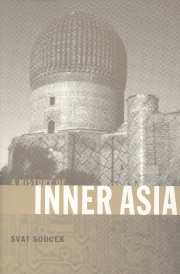Book contents
- Frontmatter
- Contents
- List of maps
- Preface
- Introduction
- 1 The beginnings
- 2 The Kök Turks, the Chinese expansion, and the Arab conquest
- 3 The Samanids
- 4 The Uighur kingdom of Qocho
- 5 The Qarakhanids
- 6 Seljukids and Ghaznavids
- 7 The conquering Mongols
- 8 The Chaghatayids
- 9 Timur and the Timurids
- 10 The last Timurids and the first Uzbeks
- 11 The Shaybanids
- 12 The rise of Russia, the fall of the Golden Horde, and the resilient Chaghatayids
- 13 The Buddhist Mongols
- 14 Bukhara, Khiva, and Khoqand in the seventeenth to nineteenth centuries
- 15 The Russian conquest and rule of Central Asia
- 16 From Governorates-General to Union Republics
- 17 Soviet Central Asia
- 18 Central Asia becomes independent
- 19 Sinkiang as part of China
- 20 Independent Central Asian Republics
- 21 The Republic of Mongolia
- Summary and conclusion
- Appendix 1 Dynastic tables
- Appendix 2 Country data
- Select bibliography
- Index
16 - From Governorates-General to Union Republics
Published online by Cambridge University Press: 05 June 2012
- Frontmatter
- Contents
- List of maps
- Preface
- Introduction
- 1 The beginnings
- 2 The Kök Turks, the Chinese expansion, and the Arab conquest
- 3 The Samanids
- 4 The Uighur kingdom of Qocho
- 5 The Qarakhanids
- 6 Seljukids and Ghaznavids
- 7 The conquering Mongols
- 8 The Chaghatayids
- 9 Timur and the Timurids
- 10 The last Timurids and the first Uzbeks
- 11 The Shaybanids
- 12 The rise of Russia, the fall of the Golden Horde, and the resilient Chaghatayids
- 13 The Buddhist Mongols
- 14 Bukhara, Khiva, and Khoqand in the seventeenth to nineteenth centuries
- 15 The Russian conquest and rule of Central Asia
- 16 From Governorates-General to Union Republics
- 17 Soviet Central Asia
- 18 Central Asia becomes independent
- 19 Sinkiang as part of China
- 20 Independent Central Asian Republics
- 21 The Republic of Mongolia
- Summary and conclusion
- Appendix 1 Dynastic tables
- Appendix 2 Country data
- Select bibliography
- Index
Summary
Among the symptoms of the second-class citizenship that the Muslims of Central Asia experienced in Tsarist Russia was their official status as inorodtsy, natives (literally, “alien-born”), and the fact that they were not required to perform military service. The latter aspect appeared to be an asset when the First World War broke out and their young men were spared shedding blood on the battlefields. In 1916, however, the imperial government took a step whose consequences proved detrimental to the Russians and disastrous for the natives: it issued a decree that large numbers of Central Asian Muslims be drafted for labor behind the battle lines – primarily that of digging trenches. The insulting nature of this order, compounded by still wilder rumors, provoked a number of uprisings in both provinces, directed against government representatives but also against civilians, especially the agricultural settlers. The authorities, taken by surprise, could not prevent serious casualties on the Russian side, but when they finally suppressed the revolts, the loss of life among the natives was staggeringly heavier and the suffering much worse. Especially hard hit were the Kyrgyz, because their attacks on the settlers in the neighborhood of the lake Issyk Kul were particularly violent and the resulting repression was that much harsher. Many fled across the border to Sinkiang, with further casualties wrought chiefly by the elements during the winter of 1916–17.
- Type
- Chapter
- Information
- A History of Inner Asia , pp. 209 - 224Publisher: Cambridge University PressPrint publication year: 2000



